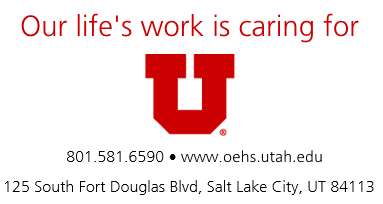FIRE PREVENTION WEEK: OCT. 9-15, 2016
Fire safety is a relevant workplace safety topic at the university. While most all university spaces are supported with state of the art fire detection, notification and suppression systems, individual actions and behaviors can have an impact on survivability in a fire situation. Here’s important fire safety information to review:
- Fires can occur around electrical equipment, where flammable chemicals are in use, and as a result of inappropriate disposal of smoking materials. Be mindful.
- Never leave food cooking unattended (stove top or microwave).
- Always use receptacles provided to extinguish smoking materials.
- Follow establish safety procedures whenever working with hazardous materials and only work with these materials in appropriately supported work areas.
- Check to ensure all electrical cords are in good condition prior to use. Do not use extension cords as a regular means to provide power to equipment or work areas.
- Never tamper with fire alarms, smoke or heat detectors.
- When a fire alarm sounds, evacuate.
- The university has a procedure to taking devices out of service when construction activity may impact. Do not assume alarms are unwarranted; rather assume the alarm is for a reason.
- Tell others around you as you are evacuating.
- As you leave your work area take personal items that are immediately available (coat, keys, cell phone); close doors as you exit.
- Assemble with your work group a safe distance away from buildings as first responders arrive.
- Do not re-enter until the “all clear” is given by Fire Department or other first responding personnel.
- Attempt to extinguish a fire with an extinguisher only if the fire is a small enough size for the extinguisher to be effective, you’ve been trained and you have a “buddy” with you to help
- Portable fire extinguishers are mounted in corridors at 75 foot intervals.
- Report missing fire extinguishers to the University Fire Marshal (1-6590).
- Extinguisher use training is available from OEHS
- Always work to eliminate obstructions
- Keep corridors and exits free of obstructions that could impede quick evacuation.
- Manage storage of materials such that sprinkler heads are not blocked.
- Manage equipment and furniture placement such that fire alarm pull stations are easy to reach.
- Be prepared!
- Power may go out in a fire: keep a flashlight or glow stick available to help you see to get out.
- Always know two ways out of your work areas.
- Correct hazards or report them to your supervisor or the University Fire Marshal.

